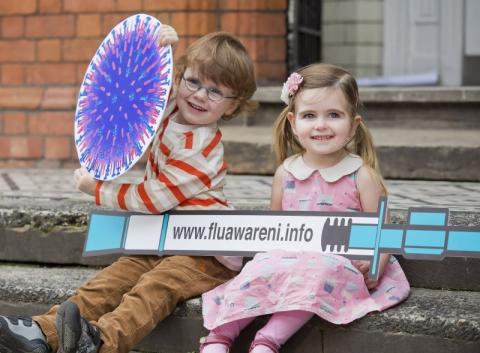The flu vaccine helps protect children who receive it, as well as their younger siblings

Children under two years are significantly more at risk of serious illness from influenza if they have older brothers or sisters, new research has shown.
The flu virus spreads through the air when people cough and sneeze without covering their nose and mouth. With children of all ages mixing at parent and toddler groups, in day nurseries and at childminders, and because young children don’t always cover their noses or mouths when coughing or sneezing the virus can spread very quickly among them.
Flu can cause the same unpleasant symptoms in children as it does with adults – fever, chills, aching muscles and joints, headache and extreme tiredness. These symptoms can last between two and seven days and for some can lead to serious illness and result in a stay in hospital.
Complications arising from flu can include bronchitis, pneumonia and painful middle ear infection. In severe cases, which are very rare, flu can lead to disability and even death.
Younger children are more at risk and more likely to end up in hospital if they get flu.
However the research suggests that babies and young children can be better protected if parents take up the opportunity to get older siblings vaccinated.
The nasal spray vaccine, which is now being offered in GP surgeries to toddlers and pre-school children aged between two and four, as well as in schools to primary school children, provides a good opportunity to help protect the children who receive it, as well as their younger siblings.
Fluenz Tetra® is given as a spray up each nostril. The child can breathe normally while the vaccine is being administered and there is no need to actively inhale or sniff.
Dr Lucy Jessop, Consultant in Health Protection at the PHA, explains the importance of the flu vaccine: “Everyone who is eligible to be vaccinated against flu should see it as a positive step in protecting their health and the health of others around them.
“Traditionally uptake rates for flu vaccination are very high in Northern Ireland, which is a result of the hard work and dedication from all involved in health and social care, and the excellent response from patients, taking their GP’s advice that they need the vaccine. So make sure everyone who is eligible for the vaccine gets it – whether they are two years old or over 65, it is important that they get vaccinated.”
As it takes approximately two weeks following vaccination to develop maximum protection against flu, it is important to get vaccinated early. Flu vaccination clinics are just getting started and everyone should aim to have the vaccine by early December. If you wait until flu starts circulating, it may be too late for the vaccine to protect you.
Women can also help reduce the risk of serious flu for their newborns by taking up the invitation to have the flu vaccine when they are still pregnant.
Pre-school children who are aged two years or over are eligible to receive the vaccine. These children will be offered the vaccine at their GP’s surgery. Meanwhile, children in primaries one to seven will be offered the vaccine in school. In addition, people over 65, ‘at risk’ children and adults, and pregnant women, can receive the flu jab at their doctor’s surgery.
For further information see: www.fluawareni.info or www.pha.site/fluleaflets
Ends
Risk factors for admission to hospital with laboratory-confirmed influenza in young children: birth cohort study. http://erj.ersjournals.com/content/50/3/1700489
